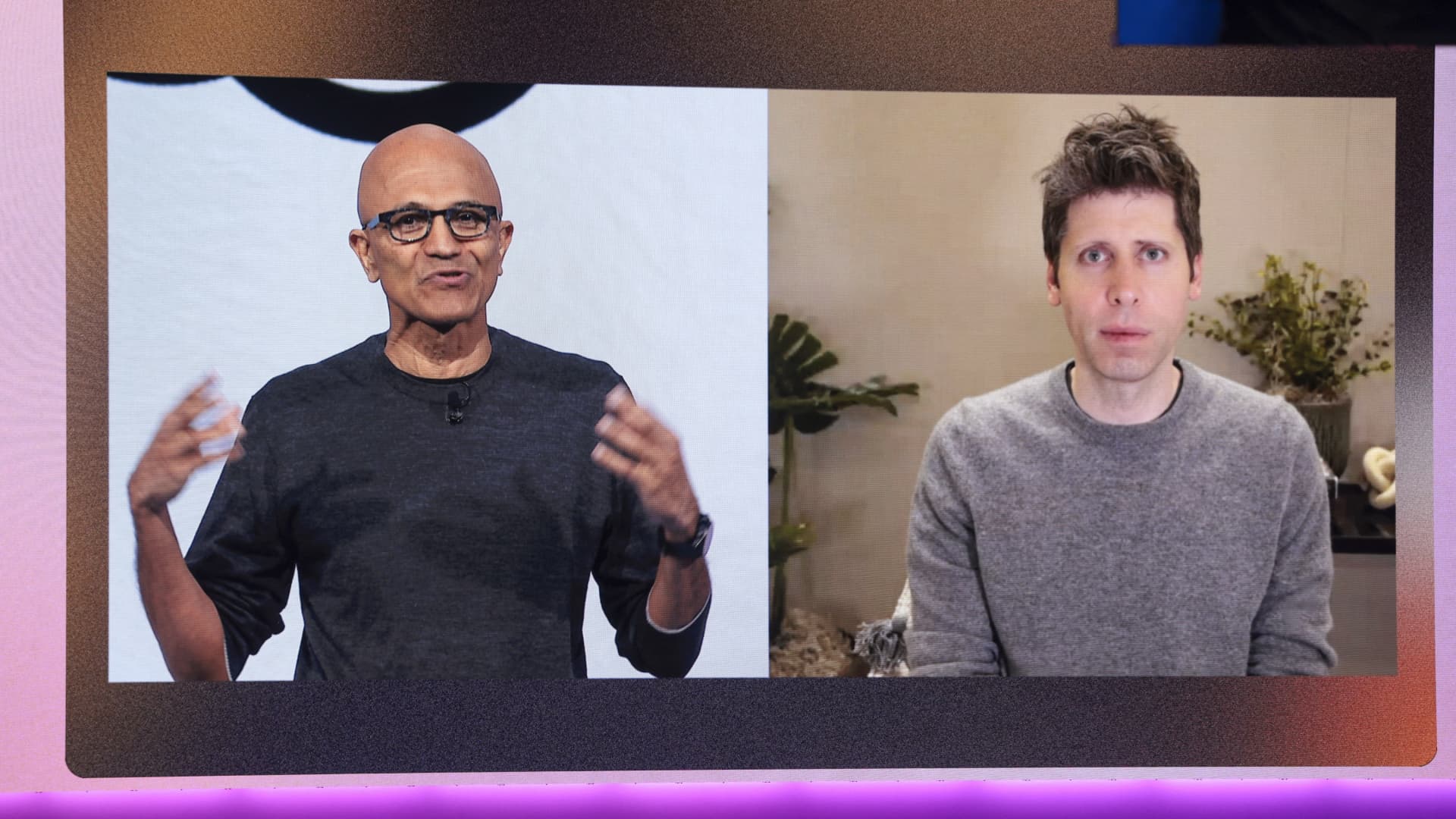.1 Billion from Net Income" src="http://aicnbc.com/wp-content/uploads/2025/10/108147622-1747681700109-gettyimages-2215434051-AFP_47CH4DB.jpeg">
Microsoft Chairman and CEO Satya Nadella (L), speaks with OpenAI CEO Sam Altman, who joined by video during the Microsoft Build 2025 conference in Seattle, Washington on May 19, 2025.
Jason Redmond | AFP | Getty Images
Microsoft absorbed a $3.1 billion impact to its first-quarter net income due to its significant investment in OpenAI, the artificial intelligence powerhouse. This development underscores the financial complexities inherent in the rapidly evolving AI landscape and the strategic bets being placed by tech giants.
According to its earnings report released Wednesday, Microsoft attributed the profit dip to an “equity method investment,” which translated to a 41-cent reduction in earnings per share. Despite this impact, Microsoft still reported a net income increase to $27.7 billion, or $3.72 per share, compared to $24.67 billion, or $3.30 per share, in the same period last year. This demonstrates the company’s underlying strength and diversified revenue streams, mitigating the short-term financial impact of the OpenAI investment.
Since its initial investment in OpenAI in 2019, Microsoft has committed a total of $13 billion to the company. As of the end of September, $11.6 billion of this commitment had already been funded, according to a recent SEC filing. This substantial investment highlights Microsoft’s conviction in OpenAI’s potential and the strategic importance of AI to its future growth.
The announcement follows OpenAI’s confirmation that it has completed a recapitalization, solidifying its organizational structure as a non-profit entity overseeing a for-profit arm. The OpenAI Foundation, the non-profit component, now holds a significant equity stake in the for-profit business, estimated at approximately $130 billion.
Under the revised structure, the OpenAI Foundation maintains a 26% stake in the for-profit entity, while current and former employees and investors hold the remaining 47%. This structure aims to balance the pursuit of profit with OpenAI’s broader mission of developing AI for the benefit of humanity.
Microsoft’s investment in the public benefit corporation is now valued at $135 billion, representing approximately 27% of the company on an as-converted diluted basis. This significant stake gives Microsoft considerable influence over OpenAI’s strategic direction and access to its cutting-edge AI technologies.
Moreover, Microsoft disclosed that “OpenAI has contracted to purchase an incremental $250 billion of Azure services” as part of the agreement, further solidifying the commercial partnership and leveraging Microsoft’s cloud infrastructure. Notably, Microsoft will no longer have the right of first refusal as a compute provider, suggesting a more balanced and competitive landscape for cloud services supporting OpenAI’s operations.
During Wednesday’s earnings call, Microsoft CEO Satya Nadella hailed the relationship as “one of the most successful partnerships and investments our industry has ever seen,” emphasizing the mutual benefits derived from both companies’ growth across various dimensions. The partnership is not solely financial; it promotes collaborative research and development, accelerating innovation in the AI field.
While Microsoft and OpenAI have collaborated for over half a decade, their relationship transcends beyond a simple partnership. Even before the launch of ChatGPT in late 2022, the companies have been increasingly competing in different segments of the AI market. This dynamic tension drives each company to achieve better innovation and explore new horizons.
Over a year ago, Microsoft officially recognized OpenAI as a competitor in its latest annual report, joining technology heavyweights such as Amazon, Apple, Google, and Meta. This acknowledgment reflects the growing maturity of the AI market and the intensifying competition among the major players.
Microsoft specifically identified OpenAI, the creator of the popular ChatGPT chatbot, as a direct competitor in AI offerings and in the search and news advertising sectors. This move came shortly after OpenAI unveiled a prototype of a search engine called SearchGPT, signaling its ambition to challenge Google’s dominance in the search market.
Microsoft has heavily relied on OpenAI’s advanced models to power AI features in its core products. However, in August, Microsoft announced that it had commenced public testing of its own in-house AI model to make enhancements to its Copilot assistant for consumers, marking a shift towards greater self-reliance in AI development.
Despite the OpenAI investment impacting net income, Microsoft reported stronger-than-expected earnings and profit on Wednesday. The Azure cloud platform continues to be the primary growth catalyst, posting a 40% revenue increase, exceeding analysts’ forecasts. This indicates the strength of Microsoft’s cloud business and its ability to generate substantial revenue growth despite the competitive pressures in the market.
Original article, Author: Tobias. If you wish to reprint this article, please indicate the source:https://aicnbc.com/11875.html

